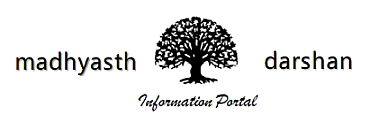Knowledge Wisdom Science
Knowledge
Knowledge is the anchor for the human being, his innate, inalienable need. This knowledge is:
- Knowledge of realistic-view of Existence: [अस्तित्व दर्शन ज्ञान]
- Existence is Coexistence, as nature saturated in all-pervasive ‘space/energy’. Nature = collection of active units = physiochemical and conscious units.
- Knowledge of all four dimensions of nature (matter): form, properties, innate-nature & religion (rup, gun, swabhav & dharm) consisting of formful and formless dimensions
- Knowledge of Conscious Self (Jeevan): [जीवन ज्ञान]
- Knowledge of the 10 activities in the Self (Conscious) and the 5 Potentials and 5 Forces.
- Viz: Tasting & Choosing; Evaluating & Analysing; Contemplating & Visualising; Comprehension & Determination; Realization & Evidencing corresponding respectively to the experiencer, disposition, mind, intellect & soul (mun, vritti, citta, buddhi & atma)
- Knowledge of perfect-Humane Conduct: (मानवीयता पूर्ण आचरण ज्ञान)
- Living in human-human relationships and human-nature relationships. – as humane values, character & ethics

Wisdom (viveka)
While knowledge enables understanding of what exists, and how it exists, Wisdom based on knowledge provides the purpose for human living:
Wisdom or Conscience based on Knowledge is defined as knowledge of the
- immortality of the conscious self (jeevan) & mortality of the body – hence enables discrimination between ‘true & false’
- knowledge of the laws of living as intellectual law, social law and natural law – hence enables discrimination between ‘right & wrong’
On the basis of the above identification, wisdom enables the identification of the Universal Human Goal in the form of:
- Resolution (samadhaan) in every Individual
- (leading to happiness) [हर व्यक्ती में समाधान ]
- Prosperity in every Family
- (leading to happiness, peace) [हर परिवार में समृद्धी]
- Fearlessness (Trust) in Society
- (leading to happiness, peace, satisfaction) [समाज में अभय]
- Coexistence in all four ‘natural-orders’
- (leading to happiness, peace, satisfaction + bliss) [प्रकृति में सह-अस्तित्व]
Science (vigyan)
THE CURRENT SCIENTIFIC OUTCOME:
Humans want to succeed in the method of science. Science so far has faced the following two experimental & behavioral difficulties in being able to succeed:
- Firstly, could not find out any clue about the ultimate truth,
- Secondly, could not find out the basic unit, basic energy & their goal
Science’s attempt to recognize the human as being equivalent to a machine and has been entirely unsuccessful.
The scientific view is committed to struggle. On this basis, it is postulated that entire nature other than humans is for human consumption. People and technology based on science have ended up trying to dominate nature. This is at the root of our ecological crisis. Will science take responsibility for this outcome? Which scientist is even ready to assume this responsibility? (for natural destruction). Who is responsible for science?
The book or the human?
Instruments which are an outcome of such books are assumed to be the basis for the ultimate truth. In this manner, rather than humans taking up responsibility, this responsibility has been imposed on the instrument. This was so we could escape getting embroiled in logic. An instrument cannot be argues with, since a machine/instrument keeps repeating the results. In this manner, reiterating repeatedly was assumed to be the basis for trust. On the basis of scientific endeavor, Humans thus moved away from assuming responsibility for their actions (extrapolating it on the machine). Whereas, we find on scrutiny and observation that every human is in favor of assuming responsibility. Every human is in favor of justice, is in favor of order. At the base of all of this, every human is in favor of being wise.
From the co-existential view, we can thus see that while knowledge enables understanding of what exists, & wisdom provides the purpose & goal, science determines how to achieve these goals – the direction for achieving the universal human-goal. Science consists of: :
- Knowledge of Activity or procedural knowledge
- (Activity is continuous, eternal-active-presence; never ceases since units are energized by being in space)
- Knowledge of Time or chronological knowledge
- (As Past, Presence & Future: The Periodicity of an activity itself is measured-time)
- Knowledge of Decision or purposeful knowledge
- (provides the direction to achieve the Human Goal identified via Wisdom – viveka)
- (provides the direction to achieve the Human Goal identified via Wisdom – viveka)
Coexistential Science thus consists of:
- Material Science – study & implementation of physical-chemical interactions & procedures
- Behavioral science – study of & implementation of human interactions & ways of living
- Spiritual science – study & practice of conscious (psychological) interactions & procedures for knowledge
The study of physiochemical nature and the use of technology, is thus for a definite purpose: to fulfill the universal human goal, and these are in keeping in mind the inherent coexistence & harmony in nature.
Science in the coexistential view, is thus not in opposition with nature, nor is it alienated from human purpose and life.
This is the meaning of wisdom-oriented science, or science with purpose.
In the coexistential view, there is absolutely no entity or reality in existence that cannot be understood. Every ‘thing’ in existence, in reality has been understood. And this can be communicated and can be lived.
